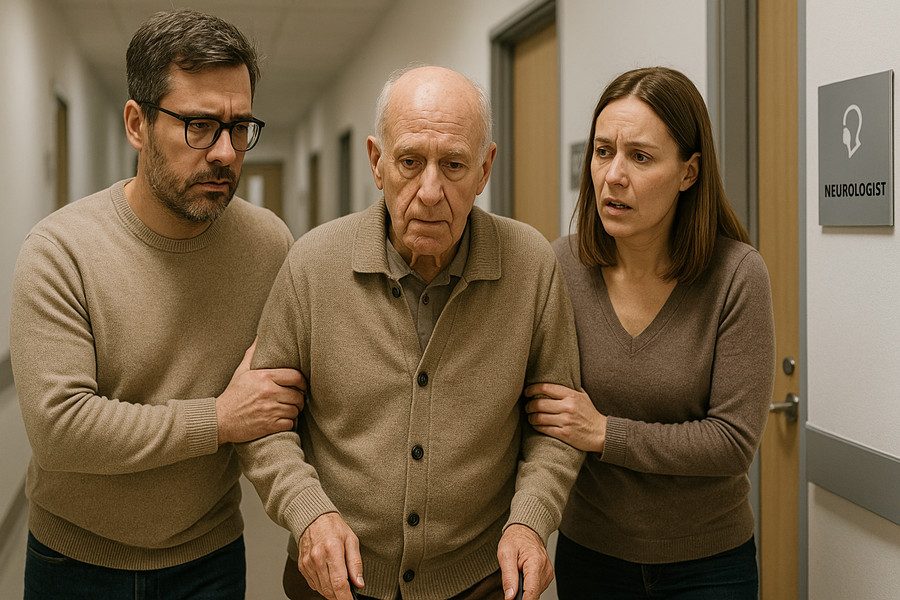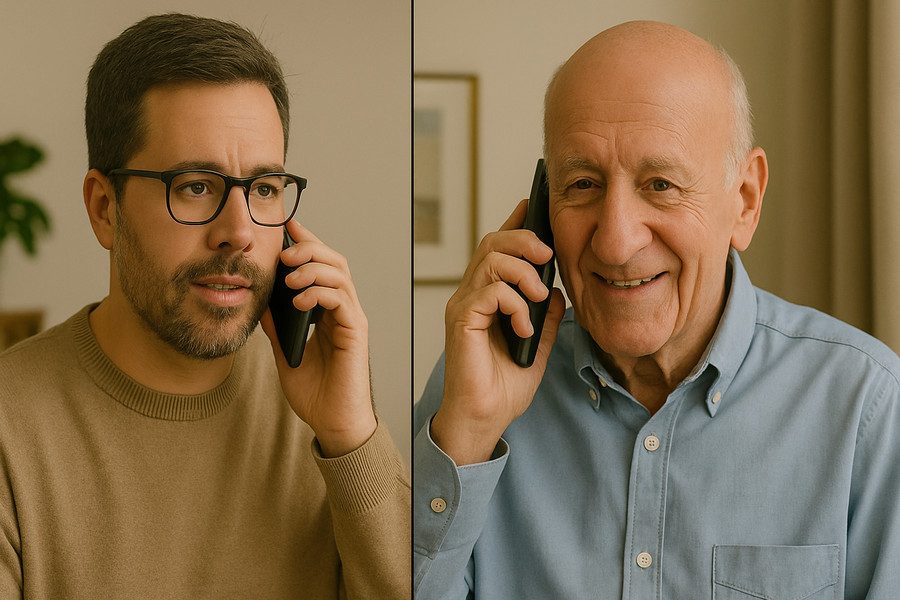


Before we begin, would you repeat these three words? Apple. Penny. Table.
Paul had his father do something like that, once. He was sitting across from him on the edge of his bed, his reading glasses tucked into the collar of a shirt he hadn’t buttoned all the way.
His father repeated the words slowly, almost reluctantly, as though humoring him.
Then he smiled and changed the subject. Paul never did ask him to recall them.
They didn’t talk about memory in their family. They talked around it.
There were jokes, of course — harmless things about “senior moments” and “what was their father saying?” But there were also gaps. Gaps that widened.
One morning, Paul’s father stood in the middle of the kitchen staring at the microwave. Not using it. Just watching the clock.
When Paul asked what he was doing, he blinked and said,
“Waiting for it to tell me what I came in here for.”
He laughed, but Paul didn’t.

The father missed his flight two weeks before. Not by hours. By days.
They found the ticket in the junk drawer. A round-trip to Providence. The confirmation email had been printed out and circled.
And yet, on the morning he was supposed to leave, he made pancakes and asked if anyone had seen the syrup. Not one mention of the suitcase sitting by the front door.
Paul told himself that his father must’ve mixed up the date. “Anyone can forget a calendar,” he said.
But that wasn’t what was happening. Not really.
When Paul gently pressed his dad later, he said the ticket must’ve been wrong. That he knew when the flight was. That someone else had made a mistake.
He was always quick to mention that it was someone else’s fault.
Paul’s family chalked things up to fatigue. Jet lag. The house being too quiet or too noisy or too unfamiliar.
They didn’t want it to be their dad’s memory. Because if it was memory related, it might only get worse. And then they’d have to take their dad in for medical tests.

The neurologist’s office had that feeling that nothing ever happens there, even though that’s where everything starts.
The receptionist called out my dad’s name, and I watched him stiffen slightly before rising. He turned to me.
“Did they call me?”
They asked him to draw a clock. They asked him to remember three words. Not the ones I gave him. Different ones, less poetic.
They asked about the date, the president, the season.
He missed two. Not enough to call anything definite. But not enough to ignore.
The doctor told Paul what the scores meant. He said something about thresholds.
He remembered how clinical it sounded. As if personality could be graded on a scale.
As if forgetting your daughter’s birthday or where you parked the car was just a “cognitive deviation.”

Paul read somewhere that short-term memory is stored in the hippocampus. That it deteriorates slowly, like the outside of a peach in the sun.
That metaphor made sense to him. Not because he imagined the brain that way (though there is something beautiful and sad in that) but because it felt soft. Gentle.
And that’s how it starts. Not with catastrophe. With misplacement.
The memory doesn’t disappear like a dropped plate. It drifts, then blinks out, like a flashlight on its last battery. The real cruelty is that those with memory loss often don’t notice. You do.

We began to remember things for our dad.
Where the socks were. Where the car was parked. Which bills had been paid. We didn’t mind, mostly.
But sometimes we said things with a little too much emphasis.
“I told you already.”
“You asked me that this morning.”
He would look away. And we would feel it immediately, the sharpness of our tone. The childish sting of guilt. We always apologized. Too late, always.

After the appointment, Paul’s dad wanted ice cream. They walked down the block in silence. He chose pistachio and asked the girl behind the counter if she’d ever been to Spain.
She laughed. Said no. Paul watched him flirt like nothing was different. Like they weren’t already keeping track of things like his weight, his tone, his confusion, and him repeating his stories.
That was the worst part. The stories.
Paul knew every one. He knew when they skipped a sentence. He knew when they ended too early. When they started with the wrong city, the wrong job, the wrong wife.
Once, his dad told him about the year he taught history at the local college.
Paul didn’t correct him. His dad never taught history. He worked in accounting. But that story made him proud. So he let it live.

There’s a moment in every family where someone becomes a keeper. A quiet, unofficial archivist. You hold the names, the dates, the recipes.
You remember the thing about the lamp. You carry the faces, even the ones that slip from their vocabulary.
Our family never signed up for it. But there we were.
We all became quieter in our corrections.
“No, not Tuesday. It’s Sunday.”
“Yes, we just had dinner.”
“The dog’s name is Millie now.”
We sometimes corrected, and then we distracted. It became a rhythm.

Last week, Paul’s dad called from his memory care home.
“I found your mother’s ring.”
His mother’s been dead for ten years. Her ring was never lost. But his dad had it in his hand, and it made him smile.
Paul never said a word about the decade, or the drawer, or the fact that it wasn’t even her ring.
Instead, he asked what it looked like. His dad said it had blue in it. She never wore blue.
Still, Paul said he remembered it too.